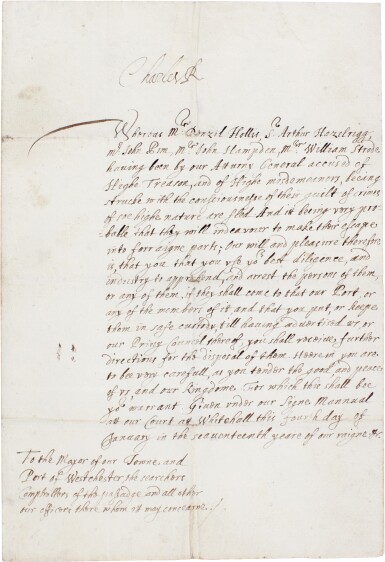
King Charles I | Document signed, ordering the arrest of the "Five Members" who had fled Parliament, 1642
Lot Closed
April 13, 01:21 PM GMT
Estimate
3,000 - 5,000 GBP
Lot Details
Description
King Charles I
Warrant signed ("Charles R") at the head, to the "Mayor of our Towne and Port of Westchester"
ordering the arrest of the "Five Members" should they "indeavour to make their escape into forraigne partes" from the port, 1 page, folio, integral blank, Whitehall, 4 January 1642, wear at folds with loss to four letters, minor soiling
"...Whereas Mr Denzil Hollis, Sir Arthur Hazelrigg, Mr John Pim, Mr John Hampden, Mr William Strode having been by our Atturny General accused of Highe Treason, and of Highe misdeneanors, beeing struck with the consciousnesse of their guilt of crimes of soe highe nature are fled...."
A DOCUMENT DIRECTLY RELATING TO A CRUCIAL MOMENT IN THE HISTORY OF THE BRITISH PARLIAMENT THAT MARKED A STEP TOWARDS CIVIL WAR. This warrant was signed within hours of the famous attempt made by the King on 4 January 1642 to enter the House of Commons with an armed guard to arrest five MPs whom he judged the leading troublemakers in an increasingly hostile Parliament. His arrival in the Chamber led to a moment of high drama with profound constitutional consequences when the Speaker refused to assist the King, asserting that he was a servant only of the Commons. The five MPs had been warned of the King's intentions and had left the chamber, and when the King realised that they had fled he made his celebrated comment, “I see that the birds are flown”. The King's breach of Parliamentary Privilege caused uproar in London, where the five men had taken shelter: the King was mobbed when he went to the Guildhall to demand the surrender of the five and within days there were barricades on the streets and the king had fled his capital. These events are commemorated annually in the State Opening of Parliament, when the doors of the Commons are ritually slammed in the face of the monarch's messenger.
PROVENANCE:
R.M. Willcocks; Sotheby's, London, 13 December 1994, lot 303
You May Also Like










![(Hamilton, Alexander, James Madison, and John Jay) | Bushrod Washington's Federalist, praised by George Washington as a "work [that] will merit the notice of Posterity"](https://dam.sothebys.com/dam/image/lot/8ec02b17-38b4-4269-8039-d4830cd55431/primary/extra_small)